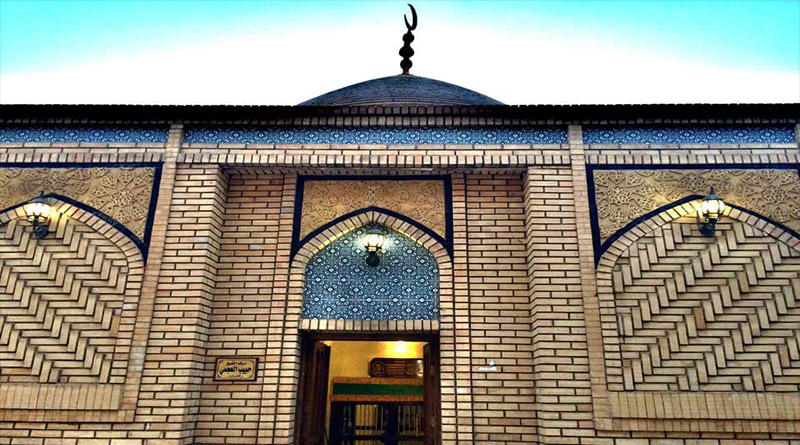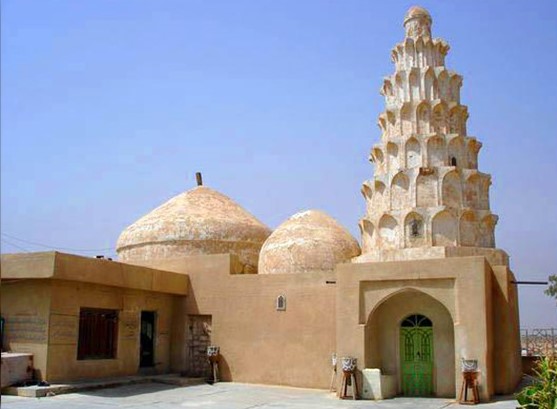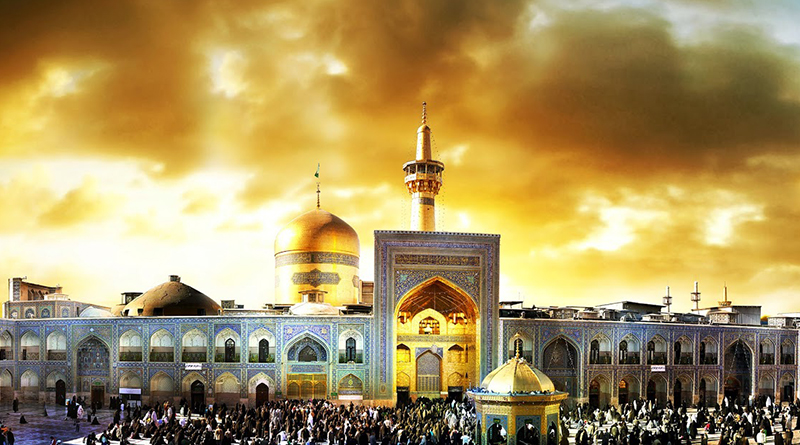Praise be to God, and blessings and perfect peace upon His beloved and chosen Prophet, the embodiment of description, revelation, message, and wisdom, and upon his family, companions, and those who follow them.
Sayyid Sheikh Muhammad al-Kasnazani al-Husayni (may God sanctify his secret) is the Sheikh of the elevated Kasnazani Qadiri Sufi Order worldwide. He is a distinguished figure among the scholars and spiritual leaders of Iraq and the Islamic world. He shines as a star in the heavens of intellectual and mystical insight—not only because he is a Sheikh of a Sufi path but also due to his unique qualifications that positioned him as a leader in religious, political, social, and scientific fields.
The Sayyid Sheikh descends from a noble Hashemite Husayni family branch of the pure Muhammadan tree, whose roots are firmly established and whose branches reach the heavens. His lineage is traced as follows: Sayyid Sheikh Muhammad, son of Sayyid Abdul Karim, son of Sayyid Abdul Qadir, son of Sayyid Abdul Karim Shah al-Kasnazani, son of Sayyid Hussein, son of Hasan, son of Sayyid Abdul Karim, son of Sayyid Ismail al-Wilayani, son of Sayyid Muhammad al-Nudhi, son of Sayyid Baba Ali al-Wandrina, son of Sayyid Baba Rasul al-Kabir, son of Sayyid Abdul Sayyid II, son of Sayyid Abdul Rasul, son of Sayyid Qalandar, son of Sayyid Abdul Sayyid, son of Sayyid Isa al-Ahdab, son of Sayyid Hussein, son of Sayyid Bayazid, son of Sayyid Abdul Karim al-Awwal, son of Sayyid Isa al-Barzanji, son of Sayyid Baba Ali al-Hamadani, son of Sayyid Yusuf al-Hamadani, son of Sayyid Muhammad al-Mansur, son of Sayyid Abdul Aziz, son of Sayyid Abdullah, son of Sayyid Ismail al-Muhaddith, son of Imam Musa al-Kadhim, son of Imam Ja’far al-Sadiq, son of Imam Muhammad al-Baqir, son of Imam Ali Zayn al-Abidin, son of Imam al-Hussain, son of Imam Ali ibn Abi Talib (may God honor his face), and Lady Fatimah al-Zahra (peace be upon her), daughter of the Messenger of God and Seal of the Prophets Muhammad (peace and blessings be upon him).
The title “Kasnazani” was given to the family’s ancestor, the pious and ascetic Sayyid Abdul Karim al-Awwal (may God sanctify his secret). The word “Kasnazani” is Kurdish, meaning “the person whose reality no one knows.” This title was given because he secluded himself for four years in the mountains of Qardagh, enjoying closeness to God through worship and isolation. When people asked about the Sheikh, they would say “Kasnazani.” Thus, the title became associated with the honored Sayyid and later his descendants, who continued to lead the Kasnazani Qadiri Order. Therefore, Kasnazani is both a family name and a technical term for the Sufi Order.
The tribe to which Sheikh Muhammad’s family belongs is the Barzanji Sayyids, a prominent tribe originally settled in Barzanja, northern Iraq. The tribe’s founder, Sheikh Isa al-Barzanji, is the forefather of this noble lineage blessed with both worldly and spiritual status. Today, the Barzanji Sayyids are one of the largest noble tribes in northern Iraq.
Birth and Early Life
Sayyid Sheikh Muhammad al-Kasnazani was born in the village of Karbajna, part of the Sinkaou district in Kirkuk province, northern Iraq, on Friday, the 14th of Safar 1358 AH (corresponding to April 15, 1938 AD). This village is known as the home of the Kasnazani Order’s Sheikhs.
From his early years in Karbajna, he lived in a spiritual atmosphere, as his father, Sayyid Sheikh Abdul Karim al-Kasnazani, was the Sheikh of the Order, appointed by his elder brother, the ascetic Sheikh Sultan Hussein al-Kasnazani, who was also known as “the Sultan.” Sultan Hussein was a spiritual guide and a military leader who fought the British during their occupation of Iraq and led the Battle of Karbajna, which later inspired the Battle of Darband Bazian, where the British forces were defeated and their commander captured.
His father, Sheikh Abdul Karim, was a prominent religious and social figure, expanding the Order and guiding many disciples. Sheikh Muhammad grew up imbued with spirituality, virtue, and ideals under the tutelage of great saints known for their devotion and deep reflection, alongside their national and social contributions.
Education
Sheikh Muhammad learned the path of the Order from his father and extensively studied Sufism. He was endowed with intellectual and spiritual faculties characterized by vast horizons that matured through formal studies. He studied Islamic sciences and the Arabic language under leading scholars of his time in his grandfather’s religious school in Karbajna, including scholars like Mulla Kaka Hamah Saif al-Din, Mulla Ali Mustafa (known as Ali Lilan), and Mulla Abdullah Aziz al-Karbaajni.
Beyond formal study, Sheikh Muhammad cultivated a vast personal library comprising thousands of books and manuscripts, acquired through diligent visits to manuscript houses, public endowment libraries, and the Qadiri shrine library for seventeen consecutive years.
His spiritual knowledge and faculties, enhanced by long years of dedicated asceticism and discipline, reflect a divine influx. He also deeply engaged in traditional Sufi sciences through teaching and research. This is evidenced by his major work, The Kasnazani Encyclopedia of Sufism and Mysticism, a unique contribution in its field.
Appointment as Sheikh
Sitting on the Sheikh’s carpet symbolizes divine appointment in the Order, marking the person chosen by God and His Messenger to inherit Muhammadan spiritual authority, guiding people to truth, faith, and spiritual education.
During the last visit of his father, Sheikh Abdul Karim, to the shrines of the saints in Karbajna—where Sheikh Muhammad was present—his father formally announced him as the new Sheikh of the Order, declaring:
“O my children, from today, Sayyid Sheikh Muhammad is your Sheikh. This is the command of our masters. Whoever obeys him obeys us, whoever loves him loves us, and whoever disobeys him disobeys us.”
Shortly after this last visit in 1398 AH (1978 AD), Sheikh Abdul Karim passed away, marking the transfer of leadership fully to Sheikh Muhammad. His father’s death was mourned by many scholars, poets, and admirers. For example, Sheikh Abdul Majid al-Qutb, a leading Iraqi scholar, composed a poetic elegy praising Sheikh Muhammad as the worthy successor.
Since then, Sheikh Muhammad al-Kasnazani has expanded the Order’s influence across Iraq and beyond, including Iran, Turkey, the Caucasus republics, India, Pakistan, the United States, and several European countries.
Spiritual Retreats (Khalwa)
Sheikh Muhammad entered several spiritual retreats (khalwa) after assuming leadership, teaching disciples the method and etiquette of these retreats, thereby deepening their spiritual experiences and progress.
Scholarly and Spiritual Achievements
Sheikh Muhammad has authored many works, including:
1. Al-Anwar al-Rahmaniya fi al-Tariqa al-‘Aliya al-Qadiriyya al-Kasnazaniya
2. Jala’ al-Khatir min Kalam al-Shaykh Abdul Qadir
3. Al-Tariqa al-‘Aliya al-Qadiriyya al-Kasnazaniya
4. The Kasnazani Encyclopedia of Sufism and Mysticism
Additional unpublished works include titles on miracles, human nature, Sufism as the law of the first heaven, the significance of prayer, the Islamic rosary, spiritual retreats in Islam, Sufi lodges (takiya), the Prophet’s birth and its importance, and Sufi pledges and treaties.
He has also established:
The Sheikh Muhammad al-Kasnazani College/University, offering diverse faculties such as Sharia, Sufism, religious dialogue, economics, politics, law, languages, computer sciences, and applied mathematics. This reflects his engagement with contemporary needs through modern educational methods.
An advanced Islamic calendar called The Muhammadan Calendar, dating events from the birth of the Prophet Muhammad, intended to aid Islamic historical studies while complementing the Hijri calendar.
The Central Council of Sufi Orders in Iraq to unify Sufi voices and coordinate spiritual duties amidst national challenges.
The website www.islamic-sufism.com, a modern platform representing his contemporary Sufi approach and fostering dialogue among Sufi groups worldwide.
The specialized site for the Kasnazani Qadiri Order, serving as its official voice and presentation.
The Global Center for Sufism and Spiritual Studies (established in 1415 AH / 1994 AD), focusing on studies of miraculous healings and the comparison between supernatural phenomena and parapsychology.
His eldest son, Sheikh Dr. Shams al-Din Muhammad Nahru al-Kasnazani al-Husayni, is also active in the continuation of the Order’s spiritual leadership.
Footnotes:
1. Qardagh: The “Black Mountain” near Sulaymaniyah city.
2. Darband Bazian: A mountainous forested region between Sulaymaniyah and Kirkuk.
3. Battle of Maydan: Near the northeastern Iraq-Iran border.
4. For more on the benefits of the Muhammadan calendar in Islamic historical studies, please refer to the specialized research on this topic.




